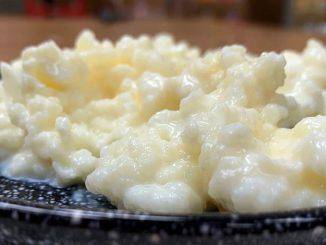
One of the most frequently asked questions by people interested in fermented probiotic products concerns the differences between Kefir and Kombucha. Both Kefir and Kombucha gained worldwide popularity in recent years with their undisputed probiotic properties, but which one is better? Which one contains more probiotics, and which one provides more advantages for our health?
We are going to answer all these equations, but let’s clarify first: in this article, we are going to compare only Water Kefir and Kombucha, and we have a good reason.
As we know, there are two fundamentally different types of Kefir: Water Kefir and Milk Kefir. However, there is no reason to compare Kombucha with Milk Kefir as these products are just too different.
Milk kefir is a dairy product similar to yogurt and has a considerably different set of probiotic and organoleptic properties. Although it is still a very potent probiotic product, Milk Kefir is fundamentally different from Kombucha, and we consider that a comparison between Milk Kefir and Kombucha would be like “comparing apples and oranges.” They are just too different!
So, since Water Kefir and Kombucha are both water-based and non-dairy probiotic drinks, let’s look closer at their similarities, differences, and what are thеir advantages and disadvantages.
What are the similarities between Water Kefir and Kombucha?
Both Water kefir and Kombucha are water-based, tangy, slightly sweet, low alcoholic, mildly effervescent (bubbly) probiotic drinks resulting from the fermentation of sweetened water solutions in the presence of specific microbial colonies called SCOBY (standing for Symbiotic Culture Of Bacteria and Yeast).
They are both rich in bacterial strains and yeast that supply the body with valuable sets of probiotic cultures and nutrients. Both of them have beneficial effects on many systems of the body, and both are excellent sources of hydration.
The similarities, however, end here. As you are going to see below, everything else is fundamentally different.
What are the differences between Water Kefir and Kombucha?
Microbial colonies (or SCOBY)
The Symbiotic Cultures Of Bacteria and Yeast, or SCOBY, used to make Water Kefir and Kombucha, are entirely different.

The SCOBY of Kombucha (also called tea mushroom or tea fungus) is a jelly-like brownish mass, quite similar to the mushroom commonly found in vinegar. However, while it is frequently named “mushroom”, it is not entirely composed of fungus but includes a more complex symbiotic colony of bacteria and yeast held together by a polysaccharide matrix.
On the other hand, as opposed to the SCOBY of Water Kefir, Kombucha mushroom contains much more fungus and yeast than bacteria. The fungi and yeast present in Kombucha are mainly of the type Brettanomyces and Saccharomyces. Bacterial components of Kombucha include several species, primarily acetic acid bacteria types like Komagataeibacter xylinus.

Unlike Kombucha, the SCOBY of Water Kefir (also known as tibicos or Water Kefir grains) is a set of small semi-transparent grains held together by a polysaccharide biofilm matrix created mainly by bacteria.
Although they are called Kefir “grains”, they actually have nothing to do with cereal grains and do not contain any starch or gluten. Similar to Kombucha, Water Kefir grains are a symbiotic colony of microorganisms – bacteria and yeasts.
Water Kefir grains contain much more bacteria and less yeast than Kombucha, and its typical bacterial mix consists of the species Lactobacillus, Streptococcus, Pediococcus, and Leuconostoc. Yet, Water Kefir grains also contain yeasts, mostly from the Saccharomyces, Candida, and Kloeckera species.
So, briefly, while both Water Kefir and Kombucha contain bacteria, fungus, and yeast, Kombucha SCOBY predominantly contains fungus and yeast, whereas Water Kefir grains predominantly contain probiotic bacterial strains.
In the following table, you can see an analysis of the microbial content (bacteria and yeasts) of two specific Water Kefir and Kombucha samples. Note that this is just an example, and the microbial populations of different Kefir and Kombucha samples may vary considerably.
| Water Kefir | Kombucha | |
| Bacteria | Lactobacillus casei Lactobacillus hilgardii Lactobacillus hordei Lactobacillus nagelii Lactobacillus citreum Lactobacillus mesenteroides Acetobacter fabarum Acetobacter orientalis |
Acetobacter xylinum Acetobacter aceti Acetobacter pasteurianus Gluconobacter |
| Yeasts | Hanseniaspora valbyensis Lachancea fermentati Saccharomyces cerevisiae Zygotorulaspora florentina |
Brettanomyces Brettanomyces bruxellensis Brettanomyces intermedius Candida famata Mycoderma Mycotorula Pichia membranaefaciens Saccharomyces cerevisiae Schizosaccharomyces Torulaspora delbrueckii Torulopsis Zygosaccharomyces bailii Zygosaccharomyces rouzii |
History and origin
The word Kombucha comes from Japanese and refers to the term konbu-cha, meaning “kelp tea.” However, this is just a misapplied loanword from the Japanese language. Kombucha has nothing to do with kelp, and the Japanese kelp tea is not prepared with the typical Kombucha SCOBY.
The exact origins of Kombucha are not known, but its origins are most likely linked to China, and specifically Manchuria. The drink was also relatively widespread in Russia, although it is nowadays less common than Kefir.
The origin of Water Kefir grains (a.k.a. tibicos) is also not precisely known, but they seem to come from the opposite side of the world – Mexico. There are speculations that Water Kefir grains (also called tibicos) are found on the Opuntia cactus pads, commonly found in Mexico, where they feed and thrive in the sweet juices of the cactus.
Methods of preparation (fermentation procedures)
The overall fermentation processes and the environment in which Kombucha and Water Kefir are prepared are indeed very different.
Water Kefir grains ferment in only sugared water, whereas the SCOBY of Kombucha requires sweetened black or green tea to ferment. It is not by chance that Kombucha is also called tea mushroom, tea fungus.
However, tea is usually associated with caffeine and tannins, and both caffeine and tannins are known to have quite controversial effects on fermentation – they usually suppress all fermentation processes.
This is probably the main reason why the fermentation of Kombucha typically takes at least ten days but in some cases, the Kombucha mixture may need to ferment for up to 30 days.
Compared to the time required for fermentation of Water Kefir which is from 12 to 24 hours, the fermentation period of Kombucha is clearly much longer.
The longer duration of Kombucha fermentation is associated with a particular risk: the risk of contamination. The prolonged stay (of 10 or more days) of the SCOBY in a warm and humid environment hides a thread of development of unwanted bacteria, fungi, and even molds.
Scientific reports suggest that serious side effects and even deaths have been associated with drinking Kombucha tea, which is most probably linked to pathogenic microorganisms that can easily contaminate Kombucha during its extended fermentation.
That’s also why Kombucha is the only widespread probiotic product considered unsafe during pregnancy and breastfeeding.
Unlike Kombucha, fermentation of Water Kefir usually takes no more than 12 to 24 hours, depending on the ambient temperature.
During this relatively short period of time, when the beneficial bacteria of Kefir are intensively spreading and actively inhibiting the growth of any foreign microorganisms, contamination is considered quite unlikely. That’s possibly the reason why no severe or life-threatening side effects have ever been reported for Water Kefir (and Kefir in general).
Probiotic properties
Many health benefits have been attributed to Kombucha, including claims for treating AIDS, preventing aging, helping with anorexia, arthritis, atherosclerosis, cancer, constipation, diabetes, and other diseases.
However, most of these claims are not substantiated in any research documents. Moreover, Kombucha contains caffeine from the tea it is made of, which could not only contribute to sleep disruptions but could lead to sensations of nervousness and anxiety.
Some sources suggest that, besides the probiotic bacteria, Kombucha also contains some enzymes that support liver functions, which is why it is often regarded as a digestion aid.
On the other hand, several research documents are proving that the microbial diversity of Water Kefir and its probiotic properties are undeniably superior to the ones of Kombucha.
Water Kefir is not only delicious and easy to prepare but also packed with health benefits that are not only an excellent addition to any probiotics-focused diet but are also unmatched by any other non-dairy homemade probiotic drink.
In short, while Water Kefir is considered a potent probiotic supplement, Kombucha may be perceived as no more than good digestive support.
As we said, the most significant downside of Kombucha is the inherent risk of contamination during its long period of fermentation.
Experts consider that any positive health effects of Kombucha cannot outbalance the risk of contamination with potentially harmful bacteria and molds hidden in the way Kombucha is prepared.

How can we get Water Kefir grains and Kombucha SCOBY?
The most accessible way to get Water Kefir grains or Kombucha SCOBY is to obtain them from other Water Kefir or Kombucha users. Both Water Kefir grains and Kombucha SCOBY have the ability to multiply during the fermentation and their owners sooner or later have these SCOBYs in excess.
Alternatively, you can purchase Water Kefir grains or Kombucha SCOBY from online stores like Amazon.
Summary
Although Water Kefir and Kombucha are water-based probiotic drinks with similar looks and tastes, Water Kefir contains a much more extensive range of probiotic bacteria and yeast. Water Kefir contains on average ten different bacterial strains, predominantly from the Lactobacillus and Leuconostoc species, whereas Kombucha contains yeasts mostly from the Zygosaccharomyces, Candida, Kloeckera/Hanseniaspora, and Torulaspora species.
The preparation method of Water Kefir is considerably simpler and faster than the way Kombucha is prepared. To obtain the probiotic Water Kefir drink, you only need to add the required quantity of sugared water to the kefir grains and leave them to ferment at room temperature for only up to 24 hours.
Water Kefir has virtually no known contraindications for healthy people, including pregnant and breastfeeding women. Water Kefir may only be disadvised to people with a compromised immune system, but this is a general precaution valid for just any probiotic food containing live bacteria.
On the other hand, Kombucha requires preparing the needed quantity of black or green tea, letting the tea cool down to room temperature, and then adding the gelatinous Kombucha SCOBY to the tea for a fermentation period that usually lasts ten days or more.
This excessively long fermentation period hides the inherent risk of contamination with unwanted and probably harmful bacteria, yeasts, or molds, making Kombucha a somewhat risky product that some people should approach cautiously.
That’s the reason why consumption of Kombucha is strictly disadvised during pregnancy and breastfeeding.
Related questions
- Are Water Kefir and Kombucha vegan? Yes. Both Water Kefir and Kombucha do not contain any animal products and may be considered vegan.
- Do Water Kefir and Kombucha contain alcohol? Yes. Both Water Kefir and Kombucha may contain alcohol. The content of alcohol depends on the duration of fermentation. The longer the product ferments, the higher its alcohol content will be. The alcoholic content of a heavily fermented Water Kefir may reach 2% or more.
- Are Water Kefir and Kombucha gluten-free? Yes. Both Water Kefir and Kombucha do not contain any gluten and are well accepted by people with intolerance to gluten or suffering from Celiac disease.
- Do Water Kefir and Kombucha contain high amounts of sugar? Both Water Kefir and Kombucha are prepared with considerable amounts of sugar since sugars are the main food for the probiotic bacteria in Kefir and Kombucha. However, during fermentation, most of the sugars get converted into acids and the resulting fermented products contain considerably less sugar than the initial mixtures. The longer the product (Kefir or Kombucha) ferments, the less sugar it will contain.



